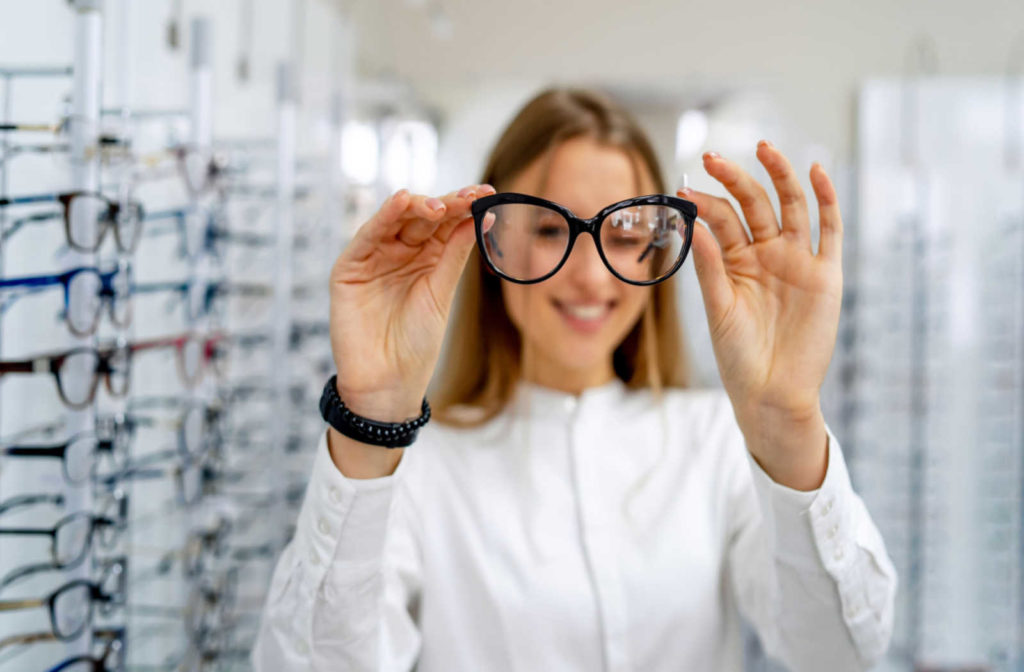You can get new glasses for several reasons, whether you recently got diagnosed with a refractive error, have a new prescription, or you’re trying out new frames or lenses. But when you try on your new pair of glasses, do objects looked curved like you’re looking through a fishbowl? Or does your depth perception feel off?
It can take a few days to a few weeks to adjust to a new pair of eyeglasses, especially if your prescription or eye health has changed, or if you’re trying out a new type of lens.
Your eye doctor will explain what to expect with your new glasses. Continue reading to learn more about the factors can influence how long it will take your eyes to adjust.
Do Your Eyes Need to Adjust to New Glasses?
Yes, your eyes need to adjust to a new pair of glasses. Your brain needs to adjust to the clearer image your eyes see.
Your eyes work harder during this adjustment period to create a clear picture in your head. Because the eyes work harder than normal, you may experience eye strain and blurry vision.
How Long Will It Take to Adjust to Your New Glasses?
How long it takes to adjust to new glasses can vary from person to person. One person might only need a few days to feel comfortable, while another needs up to 2 weeks to adjust.
While the adjustment period can take up to 2 weeks, you shouldn’t ignore any consistent irritation. Visit your optometrist if you experience headaches, eye strain, or distorted vision for more than 3 days. They can examine your eyes and see if there’s a reason for your irritation.
Common Symptoms When Adjusting to Your New Glasses
If you’re getting glasses for the first time or changing your prescription, there’s a necessary adjustment period. Your eyes and brain need to adjust to these lenses, usually taking a few days for you to feel comfortable.
During this period, you may experience issues related to your vision:
- Depth perception issues: Adjusting to new glasses can affect your depth perception, making it harder to determine how near or far an object is.
- Distortion: New glasses can make objects appear warped, bent, wavy, or out of focus.
- Eye strain: Your eyes need to work harder to focus when wearing new glasses, making them feel tired or strained.
- Fishbowl effect: Wearing new glasses can lead to a fishbowl effect where images look bent along their edges, making it feel like you’re looking through a fishbowl.
All these symptoms can make you feel sick—headaches, dizziness, or nausea are all common experiences when adjusting to new glasses.
Factors Influencing the Adjustment Period
The adjustment period to new glasses can vary significantly from person to person, influenced by several key factors. These factors include:
- Prescription strength: One of the primary influences is the change in prescription strength; a significant shift can result in a more pronounced adjustment period as your eyes and brain adapt to the new level of correction.
- Type of lenses: While single vision lenses might only require a short adaptation time, bifocals and progressive lenses can take longer due to the need to get used to the different fields of vision.
- Lens coatings or tints: anti-reflective or blue light filters can cause initial discomfort as your eyes adjust to the altered visual experience
- Personal factors: age and overall eye health can also affect the adjustment period, with younger individuals and those with healthy eyes typically adapting faster than older adults or those with preexisting eye conditions.

Do Your Eyes Need to Adjust to New Glasses When Your Prescription Hasn’t Changed?
Sometimes, your eyes need time to adjust to new glasses, even when your prescription hasn’t changed. Different lenses or frames can affect your eyes, making them have to readjust to your new glasses.
Different Lenses
How you see through your lenses can change if you get a different kind of lens in your glasses. Switching to a progressive or thinner lens can mean your eyes need time to adjust.
Different Frames
The frames of your glasses affect more than your style—they can alter the shape, size, and curve of your lenses. Your lens may feel different regardless of your prescription staying the same.
Changing the style of frames you use may mean the lens’s size or curvature must change to fit the frames. Because of the different dimensions of your lenses, your eyes may need to readjust to your glasses.
How Can You More Easily Adjust to Your New Glasses?
The solution is simple if you’re adjusting to new glasses: wear your glasses as much as possible. Putting on your glasses right away when you wake up and wearing them all day will help you feel more comfortable sooner.
It can feel tempting to wear your old glasses, especially if they feel more comfortable. However, it’s ineffective to switch between your new and old glasses.
Constantly switching between your glasses will make adjusting to your new pair harder and increase the overall adjustment period. Avoid wearing your old lenses, even if you have the same prescription as before.
Other tips for easing the adjustment period include:
- Gradually increasing wear time of your new glasses
- Ensuring proper fit and alignment of the glasses
- Taking regular breaks when needed
- Staying hydrated and maintaining overall eye health
Enjoy Your New Glasses
While dealing with potential headaches and blurry vision can be frustrating, adjusting to new glasses is a natural process. The best thing you can do for your eyes is to wear your new glasses as much as possible. You should have clear and comfortable vision in no time.
Your eye doctor is always available to help if you have concerns about your new glasses. Visit them if you experience headaches, eye strain, or distorted vision for more than a few days. Your optometrist can examine your eyes and see if there’s an underlying issue affecting your vision. Contact your eye doctor at Seal Beach Eyes if you’re interested in new glasses or if you have any questions or concerns.



